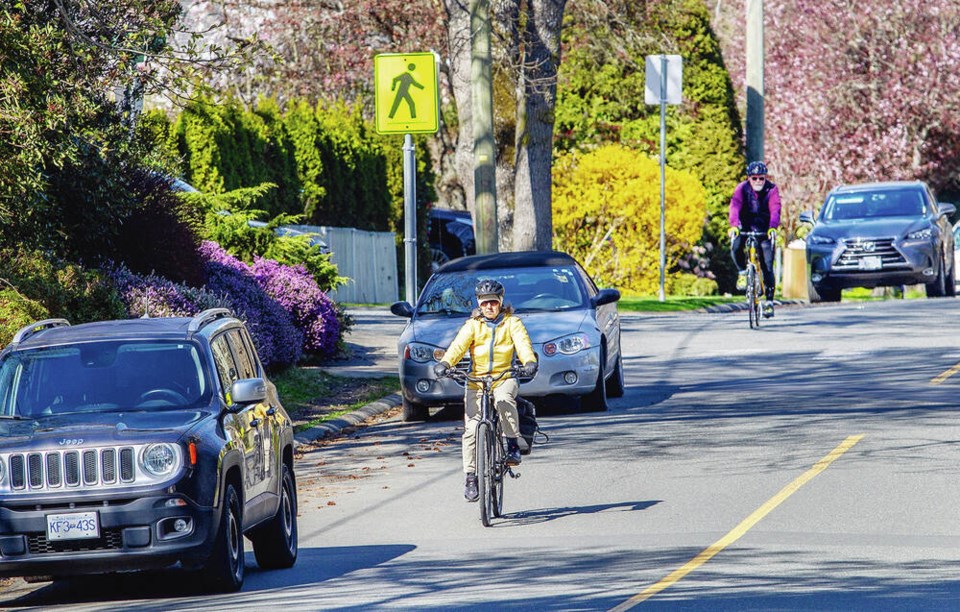Oak Bay’s many needs matter more than wants
Oak Bay council’s financial plan is addressing the district’s hundreds of millions of infrastructure deficit with five years of tax increases of at most 10 per cent. Much of the “crumbling” infrastructure issues are the result of long-standing neglect of our roads, water pipes and sewer pipes. The plan is just that: A plan with much uncertainty about the numbers.
Before the March 28 committee of the whole meeting, council members were given a consultants’ report that examined our water pipes. At the meeting, Coun. Cairine Green reminded councillors of a major finding: “52 kilometres of our water pipes are in need of major repair.”
The obvious conclusion is that the water pipes must be replaced as soon as possible. For efficiency, we must replace the sewer pipes at the same time.
In spite of this report and our horrendous debt, councillors Andrew Appleton, Lesley Watson and Carrie Smart persisted in demanding the resources for bike lanes at the level discussed at the March 25 committee of the whole meeting, leading to a 10.4 per cent budget increase. Fortunately, they were outvoted by Mayor Kevin Murdoch and councillors Hazel Braithwaite, Green and Esther Patterson, and a reduced amount was set aside.
It is clear that Oak Bay’s present needs — fix our roads, water pipes and sewer pipes — trump our wants of expedited bikes lanes. Also probably other wants. Carnarvon Park upgrades?
Mike Wilmut
Oak Bay
Avoiding difficult issues while spending cash
After several months away, it is a bit depressing to return to Victoria to find council has spent a great deal of taxpayer money:
1. Buying an abandoned restaurant on Blanshard Street to, unbelievably, make into a small park (perhaps for street folks to camp in?).
2. Buying the Hermann’s Jazz Club building — perhaps for cultural reasons.
Council has done nothing about the shameful chaos of street campers on Pandora Avenue east of Quadra. One sad result of this inaction is that a truly iconic Victoria cultural venue — the Alix Goolden Hall — remains surrounded by fencing, garbage and tents.
I suspect many folks are reluctant to walk this area after dark to get to concerts. Too bad council, as always, manages to avoid the difficult issues while spending money irresponsibly on questionable projects.
Parts of our city are becoming “no go zones” for many taxpaying citizens. Enough of the excuses that this problem is a provincial/federal responsibility.
Surely it is past time for council to ban all camping on sidewalks, medians and parks. Instead of jazz clubs and old restaurants, council should purchase, or re-purpose, some land to create a controlled space where these unfortunate street folks can pitch their tents safely, without fear of stabbings.
“Controlled” should mean an adequate presence of police to render the site safe from criminal elements, adequate support from social services and mental health professionals, showers, toilets, and a regular free bus service to enable these folks to access the services available on Pandora — during the day.
Come on council — it ain’t that complicated.
Jamie Kyles
Victoria
Langford in better shape than Oak Bay
Re: “No, density won’t result in lower taxes,” letter, April 2.
The letter does not acknowledge the reasoning behind Langford’s property tax increase. For many years, Langford city council elected to withdraw funds from its amenity fund rather than implement more moderate tax increases. Additionally, despite the larger percentage increase, the cost per taxpayer comes out to less than the increase in Oak Bay.
What Langford has spent on infrastructure will carry it well into the future, with moderate projected tax increases later in the decade.
The same cannot be said for Oak Bay and its $500-million infrastructure deficit.
Tasos Stamadianos
Victoria
Better bus service is not the answer
Re: “Comment: Instead of expanding highways, let’s improve public transit,” March 28.
As laudable, needed, and well-meaning the suggestion of improving bus service over the Malahat is, buses are — and will continue to be — subject to the same delays and blockages that have prompted the ministry to expand the highway in the first place.
Rail avoids the traffic, severe weather, injuries and deaths from accidents that are plaguing the highway. It would once again, with the prudent investments recommended by the Island Corridor Foundation, provide a safer, more reliable, all weather, attractive, affordable, and greener transportation choice for passengers and businesses.
Trains would connect with buses, also taxis and shared rides, and cycling/walking trails, and local trucking services on both sides of the Malahat, along with ferries and air services.
The danger of a bus-only approach is that it is a Trojan Horse to Malahat “freewayfication,” with stuck buses no doubt leading to calls for bus/HOV lanes when in fact bus/HOV demand will be too small for them.
Instead, these new lanes would open to general traffic and become clogged in a few years, as we have seen here and elsewhere.
This will lead to more loss of open space, higher food costs, growing food insecurity and accelerating climate heating to the point where our Island and our planet risks becoming uninhabitable.
Norah Macey
Esquimalt
SEND US YOUR LETTERS
• Email: [email protected]
• Mail: Letters to the editor, ÎÚŃ»´«Ă˝, 201-655 Tyee Rd., Victoria, ÎÚŃ»´«Ă˝ V9A 6X5
• Submissions should be no more than 250 words; subject to editing for length and clarity. Provide your contact information; it will not be published. Avoid sending your letter as an email attachment.



